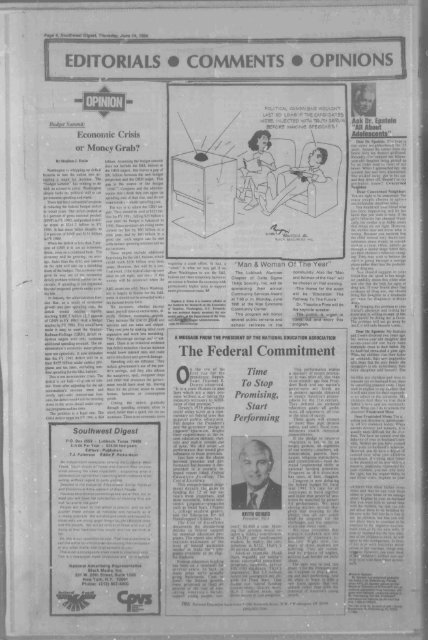View/Open - Texas Tech University
View/Open - Texas Tech University
View/Open - Texas Tech University
Create successful ePaper yourself
Turn your PDF publications into a flip-book with our unique Google optimized e-Paper software.
f<br />
II<br />
EDITORIALS COMMENTS OPINIONS<br />
1<br />
Budget Summit:<br />
Economic Crisis<br />
or Money Grab?<br />
By Stephen J. flntln<br />
Washington is whipping up deficit<br />
hysteria to lum thi nation into ac--<br />
iSA<br />
OTg5ttimtrtlr ha nothjng to do<br />
vjtflt an economic dtsis. sIflnglon<br />
simply lacks the political wilt to cut<br />
government spending anthvasta.<br />
mere ims gaun suusinwuui piuyicoa<br />
in reducing the federal budget deficit<br />
in recent years. The deficit peaked at<br />
6.3 percent of gross national product<br />
(GNP) in FY 1983, and peaked in dollar<br />
terms at $221.2 billion in FY<br />
1986. It has since fallen sharply, to<br />
2.9 percent of GNP and $151 billion<br />
in FY 1989.<br />
When the deficit is less than 3 percent<br />
of GNP, it is not an economic<br />
threat, even on a continual basis. The<br />
economy will be growing, on average,<br />
faster than the debt, and interest<br />
on the debt will take up a shrinking<br />
share of the budget. The economy can<br />
grow its way out of the remaining<br />
deficit problem without Jlurth&r tax increases,<br />
if spending Jl riot ponded<br />
beyond projected gmwth urtr existing<br />
lsjjk<br />
In January, the administration forecast<br />
that, as a result of economic<br />
growth and past spending cuts, the<br />
deficit would decline rapidly,<br />
reaching $400.5 bjllion H-- 3 percent<br />
of GNP) in FY F991VwitH a budget<br />
Surplus by FY 1995. This would have<br />
made Gramm-udman-Hollin- it easy to meet the gs<br />
(GRH) deficit reduction<br />
targets with only moderate<br />
additional spending restraint. The administration's<br />
economic assumptions<br />
vere too optimistic. It now estimates<br />
tfidt the FY 1991 deficit will be at<br />
llast-$15- 5 billion under current pro-war- ns<br />
and tax rates, excluding onc-ffin- e<br />
spending for the S&L bailout.<br />
This is not an economic crisis. The<br />
deficit is not ballooning out of control.<br />
Even after adjusting for the administration's<br />
revenue error and<br />
overly optimistic interest-rat- e forecast,<br />
the deficit would still be trending<br />
down in the years ahead under ongoing<br />
programs and tax rates .<br />
The problem is a legal one. The<br />
GRH deficit target for FY 1991 is $64<br />
I<br />
billion. Assuming tha budget summit<br />
does not include the S&L bailout in<br />
the GRH targets, this loaves a gap of<br />
$91 billion between the new budget<br />
projection and the GRH tnrg&t. This<br />
gflp Is the source of the budget<br />
"drlSts; Congress and the administration<br />
don't think they can agree on<br />
sp&ndlng cuts of that size, and do not<br />
want to risk automatic spending cuts.<br />
The key is to adjust the GRH targets.<br />
They should be reset at $125 billion<br />
for FY 1991, falling $25 billion a<br />
year until the budget is balanced in<br />
1996. Since revenues are rising under<br />
current tax law by $60 billion in a<br />
slow year, and by $80 billion in a<br />
good one, such targets can be met<br />
Willi modest spending restraint and no<br />
tax increases.<br />
These targets exclude additional<br />
borrowing for the S&L bailout, which<br />
could reach $130 billion over three<br />
years. However, this will be a onetime<br />
event, if the federal cleanup crew<br />
does its job right, and some of this<br />
money will be recovered when the<br />
S&L assets are sold. Since Washington<br />
is largely to blame for the S&L<br />
mess, it should not be rewarded with a<br />
tax increase to pay for it.<br />
Tax increases, whether income<br />
taxes, payroll taxes or excise taxes, di-<br />
rectly threaten,<br />
They increase 'the'tosfof t$df and<br />
services and cut sales and output.<br />
They cost jobs by making labor more<br />
expensive and work less rewarding.<br />
They discourage savings and investment.<br />
There is no historical evidence<br />
that deficit reduction via a tax increase<br />
would lower interest rates and make<br />
up for this direct anti-growth<br />
damage.<br />
Spending cuts are different. They<br />
reduce government's use of the public's<br />
sayings, and they also release<br />
the manpower, steel, computer chips<br />
and other real resources the government<br />
would have used up, leaving<br />
them for the private sector to create<br />
homes, factories or consumption<br />
goods.<br />
Cutting the deficit gradually<br />
through spending restraint alone is<br />
much better than a quick cut via tax<br />
increases. There is no economic crisis<br />
Southwest Digest<br />
P.O. Box 2553 Lubbock, <strong>Texas</strong> 79408<br />
S15.00 Per Year - S25.00 two years<br />
Editors - Publishers t<br />
T.J. Patterson EddieP, Richardson<br />
t<br />
An independent newspaper serving the Lubfrock, Weal<br />
<strong>Texas</strong>, South Plains of <strong>Texas</strong> and Eastern New Mexico<br />
areas printing the news impartially - supporting what it<br />
believes to be right without opposing what it believes to be<br />
wrong, without regard tp party politics.<br />
Devoted to the Industrial, Educational. Social Political<br />
and Economical Advancement of Black People.<br />
You may be orHical of some things that are wittan, but. at<br />
least you will pave the satisfaction of knowing they are<br />
truthful and to the point<br />
People wUI react to that which is precis, and we will<br />
publish these articles as nreciaely and Iactually as is<br />
hjmanly posnble. We will also give credit and respect to<br />
those who are doing goqd things fout he l&bbock Area<br />
and the people. We will pe critical of those who are njf<br />
doing as they have eaid they would, and this, we think, is<br />
fair.<br />
So, this is our resolution to you: "Feel free at anytime to<br />
call this office tor information concerning this newspaper<br />
or any other matter that ietsfeamoafh to you. "<br />
This is not a propaganda sheet made to chastie or vilify.<br />
This is a newspaper made to educate and tot to agitate<br />
NjjHsml Arfytrtfflng Rprtitntttat<br />
Cluck Media, Ins.<br />
231 W. gfth ftrtftU itlHt 103<br />
Hem York. N.Y, 100(51<br />
. . --., - -<br />
economiewgrowth.<br />
requiring a crash effort. In fact, a<br />
"crash" is what we may get if we<br />
allow Washington to use the S&L<br />
bailout and other temporary factorsas<br />
an excuse to burden the economy, with<br />
permanently higher taxes to support<br />
more government waste .<br />
I i I<br />
Stephen J. Entin is a resident scholar at<br />
the Institute for Research on the Economics<br />
of Taxation, Washington, D.C. Formerly,<br />
he was assistant deputy secretary for<br />
the Department of the TreasuryidunwMbgan<br />
Administration.<br />
1890, PM Editorial Servlcos<br />
A MESSAGE FROM THE PRESIDENT OF THE NATIONAL<br />
The Federal Commitment<br />
n the eve ot nis<br />
Ifirst run for the<br />
Repub-<br />
lican Thomas E.<br />
Dewey observed,<br />
"It is a cruel illusion to pass<br />
laws which are a mere promise<br />
without a'.jo taking the<br />
measures necessary to fulfillment<br />
of that promise."<br />
Dewey's 1 939 observation<br />
could today serve as a commentary<br />
on federal laws that<br />
support public education.<br />
For despite the President's<br />
and the governors' pledge to<br />
improve education, despite<br />
their commitment at the recent<br />
education siimmit, rhetoric<br />
and reality remain out<br />
of sync. We still await ine<br />
performance that would give<br />
substance to these promises.<br />
Just how wide the chasm<br />
between promise and performance<br />
has become is documented<br />
in a recently released<br />
report titled Federal<br />
--Education Funding: The<br />
Cost of Excellence.<br />
This<br />
research-base- d docu-<br />
ment details the gaps in<br />
funding for 12 of our nation's<br />
most important, and<br />
most successful, federal education<br />
programs programs<br />
such as Head Start, Chapter<br />
1, college student grants,<br />
and the Education Fo- - All<br />
Handicapped Children Act.<br />
The Cost of Excellence<br />
documents the decade-lon- g<br />
decline in federal support<br />
for essential education programs.<br />
The report also offers<br />
realistic estimates of the<br />
level of federal assistance<br />
naoded to make the"? pro-mj- m<br />
available to all eligi-mflil4cn- is.<br />
Mwtl education funding<br />
tea wo a a treadmill for<br />
itvml yean. In fact, in<br />
ly areas we rt juutwy<br />
ncKwarai. gut is<br />
Je&f lift federal aavara<br />
lit 16<br />
lie Wje<br />
oml<br />
America's Mali<br />
ay<br />
i<br />
''presidency,<br />
TaM Wikwat Hmuiem<br />
POLITICAL CAMPAIGNS WOUL&NT<br />
LAST SO LON IF THE CANDIDATES<br />
WERE IMUECTBD WTM TRUTH SBRUW<br />
0POfcC<br />
suc<br />
"Man & Woman<br />
The Lubbock Alumnae<br />
Chapter of Delta Sigma<br />
Thefa Sorority, Inc. will be<br />
sponsoring their annual<br />
Community Services Award<br />
at 7:00 p. m. Monday, June<br />
18th at the Mae Simmons<br />
Community Center.<br />
This program will honor<br />
several public servants and<br />
school retirees in' the<br />
Time<br />
To Stop<br />
Promising,<br />
Start<br />
Performing<br />
KEITH MISER<br />
President. SEA<br />
rently $8,800 a year. Meeting<br />
that promise would require<br />
a federal contribution<br />
of $3,352 per handicapped<br />
student. In reality, the contribution<br />
is $352. That's a<br />
90 percent shortfall!<br />
Another example: Head<br />
Sun, arguably our nation's<br />
most successful preschool<br />
rograra, currently serves<br />
50,000 4aau. Tfcat'f<br />
ixnprtttive. tut 1.3 rnillm<br />
Amcneaa younatsers ereett-fjbl- e<br />
9tM<br />
tor fieaf Start. Tin<br />
our federal Awdfat<br />
deities atori<br />
Eiitmcoi jPvHIS" faememfar<br />
AsuHul tUt j t 9mm, WW.<br />
(aM)tffMa<br />
MAKING SPEECHES !<br />
lassouRcgs inc.<br />
Of The Year"<br />
community. Also the "Man<br />
and Woman of the Year" will<br />
be chosen on that evening.<br />
The theme for the eveht<br />
will be "Education: The<br />
Pathway To The Future." '<br />
Dr. Theodora Pheawill be<br />
'<br />
the keynote speaker.<br />
.TJ,publi GWa. uraedi to<br />
co-rjdUt'- -- 'enjoy<br />
program.<br />
this<br />
EDUCATION ASSOCIATION<br />
This performance makes<br />
a mockery of recent promises.<br />
It was, after all, less than<br />
three monthc ago that President<br />
Bush and our nation's<br />
governors set forth an<br />
m'pressive agenda designed<br />
to ensure America's preparedness<br />
for the 21st century.<br />
They defined six national<br />
education goals all ambitious,<br />
all impressive, all true<br />
to the ideal of equity.<br />
These goals will remain<br />
no more than pipe dreams<br />
unless, and until, fiscal commitments<br />
match rhetorical<br />
commitments.<br />
If the pledge to improve<br />
education is not to be an<br />
empty gesture, all segments<br />
of our society teachers, administrators,<br />
parents, businesses,<br />
religious institutions,<br />
and communities must demand<br />
fundamental shifts in<br />
national funding priorities.<br />
Progress in this direction<br />
has been, at best, sluggish.<br />
Congress is now debating<br />
the federal budget for fiscal<br />
year 1991. It's time for all<br />
Americans to band together<br />
and insist that powerful promises<br />
be matched by powerful<br />
performance. We need<br />
strong action, action that<br />
gives real meaning to the<br />
pledce that all our youth<br />
shall be prepared for the<br />
challenges and the opportunities<br />
tnat await them.<br />
We must remember that<br />
today's students are the<br />
guardians of America's torn<br />
o. row Right now, too<br />
many of those students are<br />
suffering. They arc victimized<br />
by pqttcics of neglect,<br />
poiictci Mt border on child<br />
The oalr way to end this<br />
tat tmmm to jtfsaiui;<br />
Mk naa aiaf<br />
m mm m wm<br />
new meat aaaafe<br />
unkiasti rataer taaa aunt- - tie<br />
KST<br />
WMtoff,<br />
fcV m<br />
--aggjg-ij-Jfa<br />
Ask Dr. Epstein<br />
"All About<br />
Adolescents"<br />
Dear Dr. Epstein: I've lived in<br />
the same neighborhood for 25<br />
years. Around the comer from my<br />
home lives my dearest girlfriend.<br />
Recently, I've noticed her fiftcen-yetr-ol- d<br />
daughter being picked up<br />
by nn older man in front of my<br />
house. When I approached hej, she<br />
seemed lost and very disoriented.<br />
She walked away, got in his car.<br />
and they drove oft. Should I let my<br />
girlfriend know? Concerned<br />
Neighbor<br />
Dear Concerned Neighbor:<br />
You are right to be concerned. Too<br />
many people choose to ignore<br />
uncomfortable situations today.<br />
You should tell your friend what<br />
has been happening and let her<br />
know that you want to help. If the<br />
girl's behavior has changed drastically,<br />
her mother is probably aware<br />
that things are not right. However,<br />
the mother mav not know what is<br />
wrong. Because you mention that<br />
the child seemed very disoriented,<br />
substance abuse should be considered<br />
as a cause. Often, parents go<br />
through a denial stage when they<br />
see their children's behavior changing.<br />
They may wish to believe the<br />
child is going through a teenage<br />
phase rather than face the probability<br />
of drug use.<br />
You should suggest to your<br />
friend that she speak to her daughter<br />
candidly about this older man<br />
and also that she look for signs of<br />
drug use. If your friend does find<br />
evidence of drug use, she should<br />
bring her daughter to a treatment<br />
program for diagnosis without<br />
delay.<br />
By bringing this problem to your<br />
friend's attentidn and letting her<br />
knojv-yo.u'r- e willing to'supp jrt her,<br />
tfOUrWPuld be doing her a favor.<br />
The problem will not go away by<br />
itself; it will only become worse.<br />
Dear Dr. Epstein: My husband<br />
and I were divorced two years ago.<br />
My twelve-year-ol- d daughter and<br />
seven-year-ol- d son have been<br />
extremely close to their father. My<br />
nd remaried<br />
a year ago.<br />
When my children visit their father<br />
on weekends, their new stepmother<br />
tells them that the only family she<br />
recognises is my their<br />
baby daughter and herself. She<br />
belittles my children and tries to<br />
separate my nd from them<br />
by cancelling planned visits. I have<br />
tried to explain to my children that<br />
it will take time for their stepmother<br />
to adjust to the situation. My<br />
children feel they've lost their<br />
father's love and are extremely<br />
upset. What can I do to remedy the<br />
situation? Frustrated Mom<br />
Dear Frustrated Mom: The si.-uatiyou<br />
describe is, unfortunately,<br />
all too common today. When<br />
parents divorce and remarry, it is<br />
usually most difficult for the children.<br />
You have no control over the<br />
behavior of your new<br />
wife. Neither do you have control<br />
over your behavior.<br />
However, you do have a degiee of<br />
control over what your children<br />
experience. If visiting iheir father<br />
in the presence of his new wife ii a<br />
negative, unpleasant experience for<br />
your children, you not only have<br />
the right, but the responsibility to<br />
end those visits. Explain to your<br />
children that their father loves<br />
them and that he can visit them<br />
either at your home or on outings<br />
alone. Explain to your<br />
that you want him to spend time<br />
with the children, but tliat you will<br />
not allow them to be belittled by<br />
his new wife. Tell him he u free to<br />
see he children, but that you will<br />
not allow them to continue to be<br />
exposed to the negative environment<br />
created by his new wife. If<br />
youi ex husband has the best interests<br />
of the children in mind, he will<br />
agree to this arrangement. In time,<br />
if hi new wife becomes more<br />
secure in her marriage, things may<br />
imgapve. However, you must think<br />
of pur children's welfare now and<br />
limit visit with their Nher accordingly.<br />
flaaSa iiattiaaaaiIAdi<br />
ewBm!SBsmS remm.<br />
ejmam,<br />
m'mehemtm- -<br />
0- -<br />
'Pyayaaw awaaWPfj aWaV

















